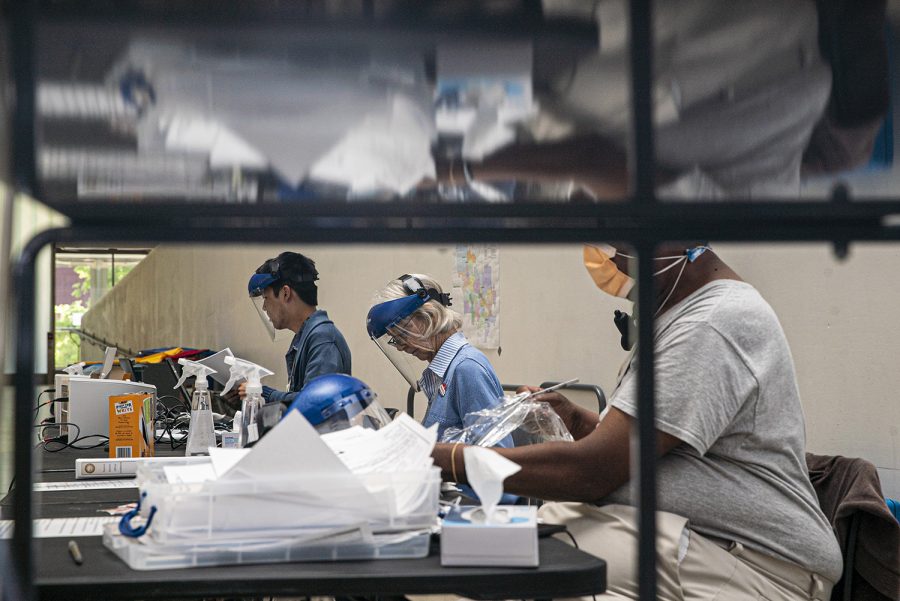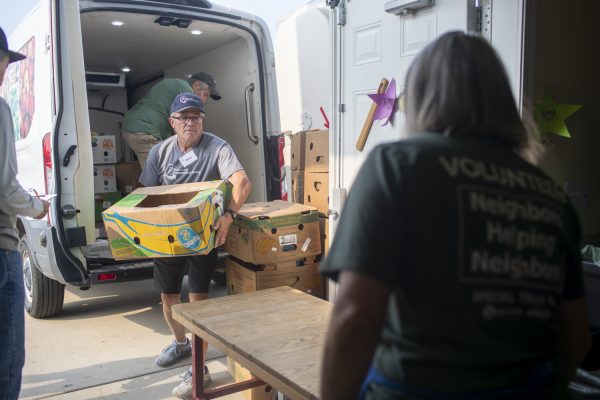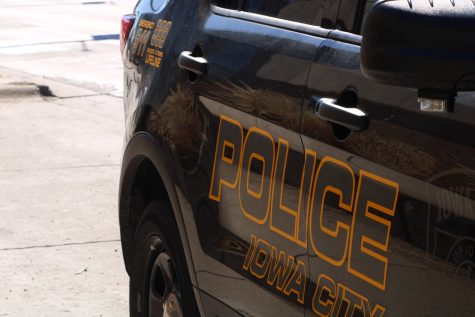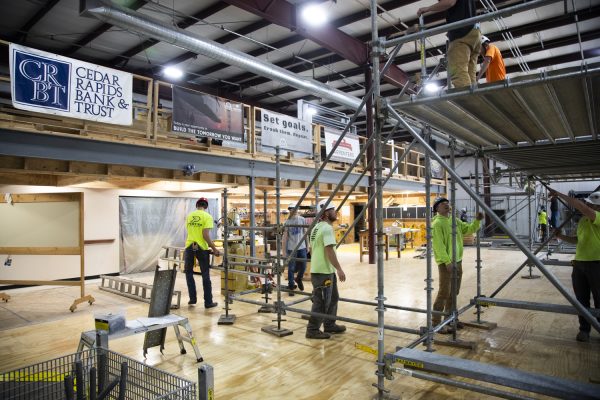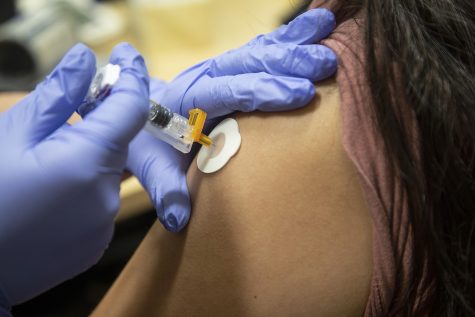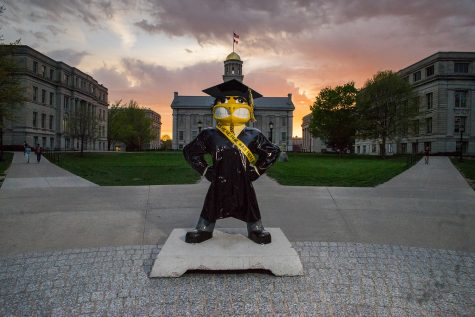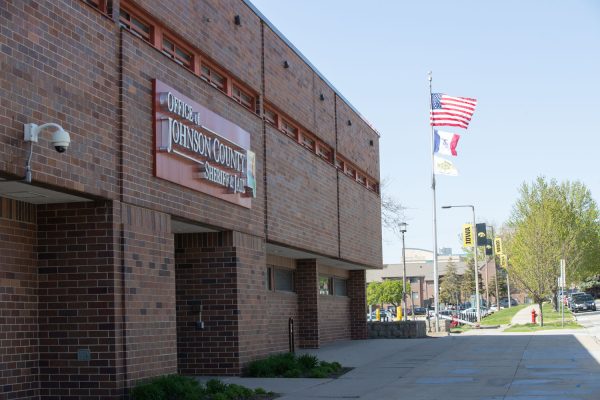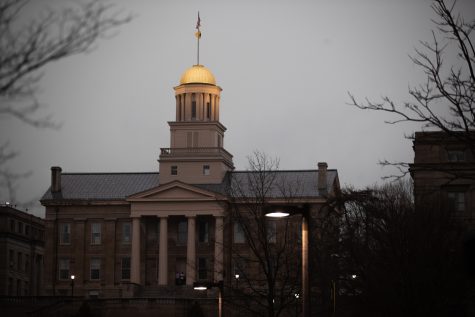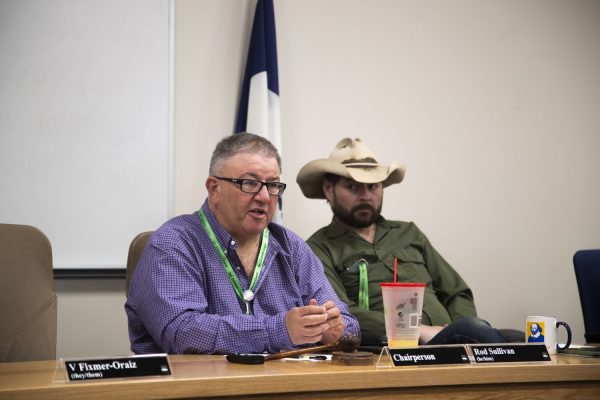State and counties ramp up poll worker recruitment ahead of general election
With the added complication of running an election during a pandemic, election officials are losing some of the people they rely on to staff polling locations and turning to social media and other outreach efforts to staff the polls.
Johnson County volunteers collect information at a primary precinct located in The University of Iowa Visual Arts building on Tuesday, June 2, 2020. Counties all across Iowa along with eight other states are participating in the 2020 primary elections.
September 1, 2020
Iowa election officials are recruiting poll workers ahead of the Nov. 3 general election to prevent a possible shortage, as many usual workers are sitting out because of the coronavirus pandemic.
In Linn County, which has been recruiting poll workers since January, there are around 400 people confirmed to work out of the 500 needed, county Auditor Joel Miller said.
Black Hawk County is expected to need 250 to 270 poll workers, elections manager Karen Showalter said, and Johnson County Auditor Travis Weipert said he is hoping to have at least 200 workers at the Johnson County polls. Both counties have recently started the recruiting process, however, and don’t have numbers of confirmed workers.
Showalter said the average age of a poll worker in Black Hawk County is 70. For the general election, around 40 percent of the usual poll workers have decided not to work, with 98 percent citing COVID-19 concerns.
According to a Pew Research study, 58 percent of poll workers in the 2018 general election were older than 61, a population more susceptible to severe symptoms and death from COVID-19.
On the national stage, this trend already led to a shortage of poll workers during primary elections in several states that led to long voting lines in places like Wisconsin and Georgia. While Iowa election officials said they had enough workers to staff the polls during the primary election, they are still doing outreach on the state and county levels to fill gaps in current staffing.
The Iowa Secretary of State’s office has an online form where people can sign up to be poll workers. Iowa Secretary of State Paul Pate said through a spokesperson in an email to The Daily Iowan that the recruitment effort worked well in the primary, with more than 1,000 people signing up through the office’s website.
Although many counties cut down on polling places for the June primary, Pate said 80 percent of votes were cast absentee, which prevented long wait times. Linn County combined 78 locations down to 19 in the primary, and Black Hawk County went from 58 to seven.
The Secretary of State’s office is again mailing absentee ballot request forms to every registered voter, and Pate said he hopes that combined with recruitment efforts will prevent long lines at polling locations in November.
“We’re reaching out to stakeholder groups, conducting a public awareness effort, targeting potential poll workers on social media in the counties that need the most help, and doing everything we can to inform the public of the need for healthy Iowans to step up,” he said.
County election officials are recruiting poll workers using social media, word of mouth, and local organizations.
Linn County has hired a full-time recruiter, Miller said, and he said he’s confident it will have enough workers for the election by Nov. 3.
“We’re just going to keep at it and try to fill the gap that we have left, but we’ve got 60 days,” he said. “…We have more people than ever in our upcoming introduction class, so I think we’re going to be in good shape.”
Weipert said the county is working with local organizations, such as the League of Women Voters and University of Iowa Campus Democrats and Republicans, to recruit poll workers.
“Everybody wants to make sure we’re all fully staffed,” he said. “I’ve had Republican friends here in Johnson County, they’re almost emailing me reaching out to me once or twice a week saying, ‘how are we doing with poll workers,’ which is great.”
Some counties are planning on consolidating polling places, though not on the same scale as in the primary election. Linn County generally has 78 locations open, and Miller said there will be 51 locations open in November. Black Hawk County will be going down from 58 to 43 locations.
However, officials don’t think this will lead to longer wait times at the polls because they expect an increase in absentee voting.
Showalter said 25 percent of Black Hawk County voters have requested an absentee ballot, which is more than voted absentee in 2016, and she’s expecting about 60 percent of voters in the general election to vote absentee.
“I feel that 43 will be adequate, and I’m not anticipating long lines,” she said.
Weipert said Johnson County hasn’t decided yet if it will need to consolidate some locations, but he said if they do have to consolidate, the office has strategies to make sure the waiting times aren’t too long.
“The math that we do in the office seeing who has and hasn’t voted at what precincts really allows us, if we do combine precincts, to make sure that we’re still at a staffing level that’s not going to make somebody wait more than probably 10 to 15 minutes,” he said. “And even in my mind as auditor, 10 to 15 minutes is too long.”



